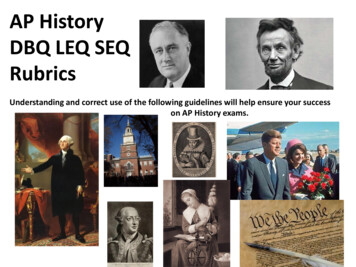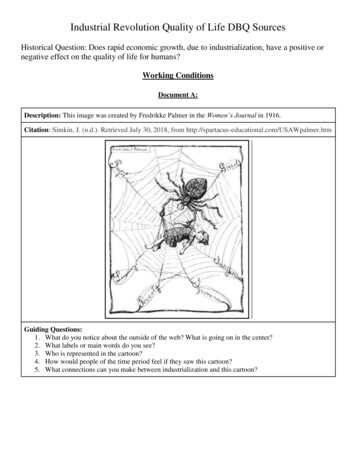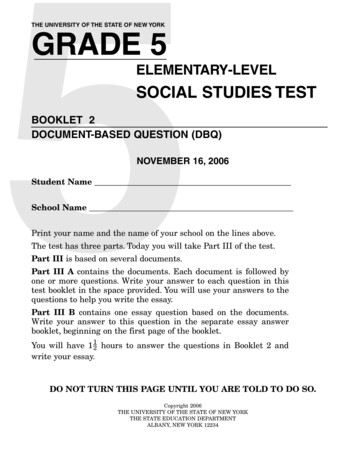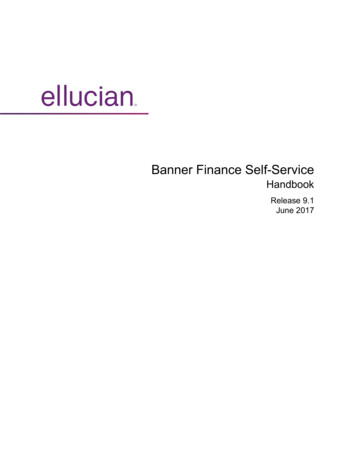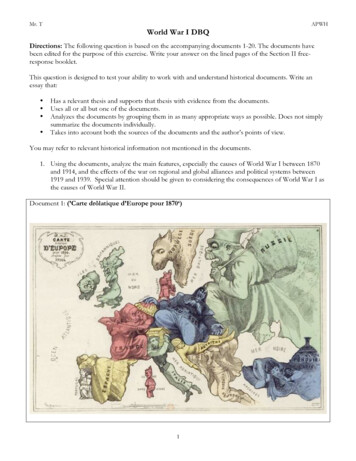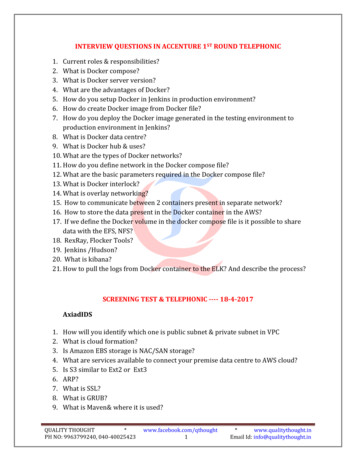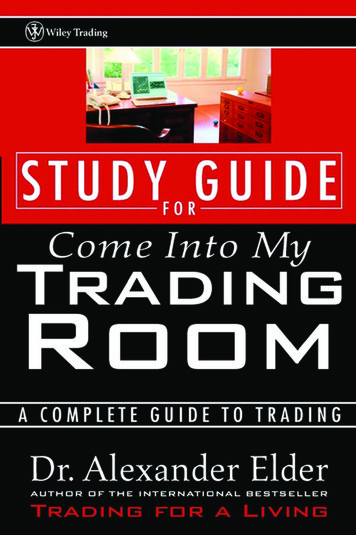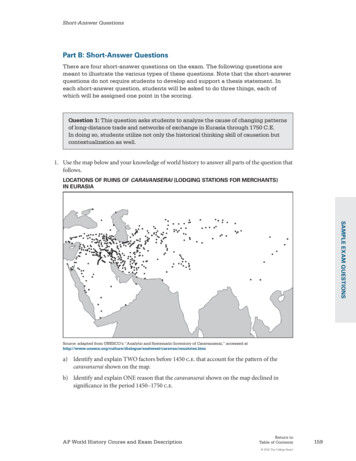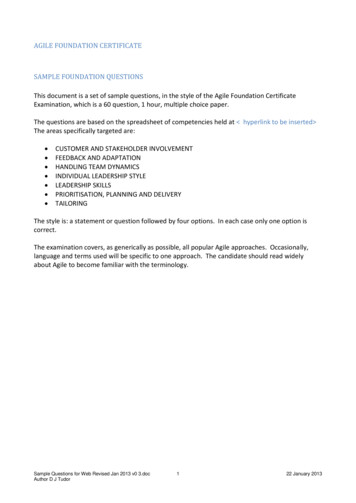
Transcription
Document-Based Questions (DBQ) ContentsPART ONEFounding the New Nation c. 33,000 B.C.– A.D. 1783DBQ 1: The Transformation of Colonial Virginia, 1606–1700 . . . . . . . . . . . A104(Correlated to pages 27–33, 66–76)DBQ 2: English-Indian Relations, 1600–1700 . . . . . . . . . . . . . . . . . . . . . . . . A106(Correlated to pages 28–42, 49, 52, 68)PART TWOBuilding the New Nation, 1776–1860DBQ 3: Thomas Jefferson and Philosophical Consistency, 1790–1809 . . . A108(Correlated to pages 191–228)DBQ 4: The Changing Place of Women, 1815–1860 . . . . . . . . . . . . . . . . . . . A110(Correlated to pages 307–308, 317–319, 320–334)PART THREETesting the New Nation, 1820–1877DBQ 5: Slavery and Sectional Attitudes, 1830–1860 . . . . . . . . . . . . . . . . . . . A112(Correlated to pages 348–370, 409–412)DBQ 6: Abraham Lincoln and the Struggle for Union andEmancipation, 1861–1865 . . . . . . . . . . . . . . . . . . . . . . . . . . . . . . . . . . A114(Correlated to pages 434–478)PART FOURForging an Industrial Society, 1865–1909DBQ 7: The Role of Capitalists, 1875–1900 . . . . . . . . . . . . . . . . . . . . . . . . . . . A116(Correlated to pages 530–544, 547–550)DBQ 8: The Farmers’ Movement, 1875–1900 . . . . . . . . . . . . . . . . . . . . . . . . . A118(Correlated to pages 525, 606–624)PART FIVEStruggling for Justice at Home and Abroad, 1901–1945DBQ 9: The United States as World Power, 1895 –1920 . . . . . . . . . . . . . . . . . A121(Correlated to pages 626–653, 685–718)DBQ 10: Foreign Policy, 1930–1941 . . . . . . . . . . . . . . . . . . . . . . . . . . . . . . . . . A124(Correlated to pages 755–769, 800–820)PART SIXMaking Modern America, 1945 to the PresentDBQ 11: Conformity and Turbulence, 1950–1970 . . . . . . . . . . . . . . . . . . . . . A127(Correlated to pages 854–880, 882–908, 909–937)DBQ 12: The Resurgence of Conservatism, 1964–2000 . . . . . . . . . . . . . . . . A130(Correlated to pages 922–1000)A103
A104Document-Based QuestionsPART ONE: Founding the New Nation, c. 33,000 B.C.–A.D. 1783DBQ 1The Transformation of Colonial Virginia, 1606–1700Directions: In this DBQ, you must compose an essay that uses both yourinterpretation of Documents A–E and your own outside knowledge of the periodmentioned in this question.Under the governance of a London-based corporation, hundreds of settlersflocked to the Virginia colony in 1606 in search of wealth and treasure. Theyencountered untold hardships. Over the next century these colonists andthose that followed transformed Virginia into one of England’s most importantNorth American colonies. Examine the challenges the Virginians faced and theways in which their efforts changed the colony socially and economically overthe century.Use these documents and your knowledge of the period from 1606–1700to compose your answer.Document ASource: George Percy, A Discourse on the Plantation ofVirginia, c. 1612.Our men were destroyed with cruel diseases asswellings, burning fevers, and by wars, and somedeparted suddenly, but for the most part they diedof mere famine. There were never Englishmen leftin a foreign country in such misery as we were inthis new discovered Virginia.Document BSource: Early tobacco advertisementDocument CSource: Father Andrew White, blank contract forindentured servant, 1635.This indenture made theday ofin theyeere of our Soveraigne Lord King Charles, &c.betweeneof the oneparty, andon theother party, Witnesseth, that the saiddoth hereby covenant promise, andgrant, to and with the saidhis Executors and Assignes, to serve him from theday of the date hereof, until his first and nextarrivall . . . and after for and during the tearmeofyeeres, in suchservice and imployment, as he the saidor his assignes shall there imploy him, according to the custome of the Countreyin the like kind. In consideration whereof , the saiddoth promiseand grant, to and with the saidto pay for his passing, and tofind him with Meat, Drinke, Apparell and Lodging, with other necessaries during the said terme;and at the end of the said terme, to give him onewhole yeeres provision of Corne, and fifty acres ofLand, according to the order of the country.
Document-Based QuestionsDocument DMiddle passage ship, date unknown.A105Document ESource: Report of Governor William Berkeley of Virginiato the Crown, 1671.Question: What number of planters, servants, andslaves; and how many parishes are there in yourplantation?Answer: We suppose, and I am very sure we donot much miscount, that there is in Virginia aboveforty thousand persons, men, women, and children,and of which there are two thousand black slaves, sixthousand Christian servants [indentured] for a shorttime. The rest are born in the country or have comein to settle and seat, in bettering their condition in agrowing country.Question: What number of English, Scots, or Irishhave for these seven years last past come yearly toplant and inhabit within your government; as alsowhat blacks or slaves have been brought in withinthe said time?Answer: Yearly, we suppose there comes in, of servants, about fifteen hundred, of which most are English, few Scotch, and fewer Irish, and not above two orthree ships of Negroes in seven years.
A106Document-Based QuestionsDBQ 2English-Indian Relations, 1600–1700Directions: In this DBQ, you must compose an essay that uses both yourinterpretation of Documents A–E and your own outside knowledge of the periodmentioned in this question.The initial encounter between the English and the Native Americans alongthe Atlantic seaboard in the early decades of the 1600s produced reactionson both sides that ranged from suspicion and doubt to friendship and support.Yet a century later the Indians had largely been pushed off their lands andthe Europeans controlled vast reaches of territory extending towards theAppalachian Mountains. Discuss the nature of the relationship between theEnglish and the Indians, the techniques used by both sides to assert theirinterests, and the reasons the English were ultimately victorious.Use these documents and your knowledge of the period from 1600–1700to compose your answer.Document ASource: Proceedings of the Virginia House ofBurgesses, 1619.Be it enacted by this present Assembly that for layinga surer foundation of the conversion of the Indiansto Christian religion, each town, city, borough, andparticularly plantation do obtain unto themselves, byjust means, a certain number of the natives’ childrento be educated by them in true religion and a civilcourse of life of which children the most towardly[promising] boys in wit and graces of nature to bebrought up by them in the first elements of literature,so as to be fitted for the college intended for them;that from thence they may be sent to that work ofconversion.Document BSource: Report of Edward Waterhouse, 1622.On Friday morning (the fatal day) the 22nd of March[1622] as also in the evening, as in other days before,they came unarmed into our houses, without bows orarrows, or other weapons, with deer, turkeys, fish,furs, and other provisions to sell and truck with usfor glass, beads, and other trifles; yea, in some places,sat down at breakfast with our people at their tables,whom immediately with their own tools andweapons, either laid down, or standing in theirhouses, they basely and barbarously murdered, notsparing either age or sex, man, woman, or child.Document CSource: J. W. Barber, Attack on a Pequot Fort during thePequot War, 1637. (See text p. 52 for full-size illustration.)
Document-Based QuestionsDocument DSource: Report of Plymouth Colonial Officials, 1675.Not to look back further than the troubles that werebetween the Colony of New Plymouth and Philip,sachem [chieftain] of Mount Hope in the year 1671,it may be remembered that . . . [he] was . . . theoffending party; and that Plymouth had just causeto take up arms against him; and it was then agreedthat he should pay that colony a certain sum ofmoney, in part of their damage and charge by himoccasioned; and he then not only renewed hisancient covenant of friendship with them; butmade himself and his people absolute subjects toour Sovereign Lord King Charles the Second . . .But sometime last winter the Governor of Plymouthwas informed by Sassamon, a faithful Indian, that thesaid Philip was undoubtedly endeavoring to raise newtroubles, and was endeavoring to engage all thesachems round about in a war against us . . .A107Document ESource: Report of the Royal Commission to theCrown, 1677.The people [became] jealous that the Governor forthe lucre of beaver and otter trade, etc., with theIndians, rather sought to protect the Indians thanthem, since after public proclamations prohibiting alltrade with the Indians (they complain), he privatelygave commission to some of his friends to truck withthem, and that those persons furnished the Indianswith powder, shot, etc., so that they were betterprovided than His Majesty’s subjects.The peoples of Charles City County (nearMerchants Hope) being [denied] a commission bythe Governor, although he was truly informed . . . ofseveral formidable bodies of Indians coming down onthe heads of the James River within fifty or sixty milesof the English plantations . . . they begin to beat updrums for volunteers to go out against the Indians,and so continued sundry days drawing into arms,the magistrates being either so remiss or of thesame faction that they suffered the disaster withoutcontradiction or endeavoring to prevent sodangerous a beginning . . .
A108Document-Based QuestionsPART TWO: Building the New Nation, 1776–1860DBQ 3Thomas Jefferson and Philosophical Consistency, 1790–1809Directions: In this DBQ, you must compose an essay that uses both yourinterpretation of Documents A–E and your own outside knowledge of the periodmentioned in this question.In the 1790s Thomas Jefferson was a major advocate of states’ rights andcritic of Federalist policies. He advised a Connecticut correspondent in thesummer of 1800,“Let the general government be reduced to foreign concerns only, andlet our affairs be disentangled from those of all other nations, except as tocommerce . . . and our general government may be reduced to a very simpleorganization, and a very unexpensive (sic) one—a few plain duties to beperformed by a few servants.”After his election in 1801, however, Jefferson often vigorously exercisedthe power of the national government and of the presidency in particular.Determine to what extent Jefferson, after entering the White House, maintained or altered his earlier philosophy of government.Use these documents and your knowledge of the period from 1790–1809to compose your answer.Document ASource: Thomas Jefferson to James Madison, letter, 1794.The excise law is an infernal one. The first error wasto admit it by the Constitution; the second, to act onthat admission; the third and last will be to make itthe instrument of dismembering the Union, andsetting us all afloat to choose which part of it wewill adhere to.Document BSource: The Kentucky Resolutions, 1798.Resolved, that the several states composing the UnitedStates of America are not united on the principle ofunlimited submission to the general government;but that, by compact, under the style and title of aConstitution for the United States, and of amendmentsthereto, they constituted a general government forspecial purposes, delegated to that government certaindefinite powers, reserving, each state to itself, theresiduary mass of right to their own self-government.Document CSource: Thomas Jefferson to John Breckinridge,letter, 1803.The Constitution has made no provision for our holding foreign territory, still less for incorporating foreignnations into our Union. The Executive, in seizing thefugitive occurrence which so much advances thegood of their country, have done an act beyond theConstitution. . . . It is the case of a guardian, investingthe money of his ward in purchasing an importantadjacent territory; and saying to him when of age,“I did this for your good. I pretend to no right to bindyou; you may disavow me, and I must get out of thescrape as I can. I thought it my duty to risk myself foryou.”
Document-Based QuestionsDocument DSource: Four Barbary States of North Africa, c. 1805.(See text p. 220 for full-size map.)ATLANTICOCEANFRANCEKINGDOMOF ITALYPORTUGALSPAINKINGDOMOF editerranean SeaTripoliTUNISIA (Scene of major fighting)ÁÁCairoThe Barbary StatesTRIPOLIEGYPTA109Document ESource: Federalist Circular in Massachusetts, c. 1808.Let every man who holds the name of America dear tohim, stretch forth his hands and put this accursedthing . . . from him. Be resolute, act like sons of liberty,of God, and your country; nerve your arm withvengeance against the Despot [Jefferson] who wouldwrest the inestimable germ of your Independencefrom you—and you shall be Conquerors!!!
A110Document-Based QuestionsDBQ 4The Changing Place of Women, 1815–1860Directions: In this DBQ, you must compose an essay that uses both yourinterpretation of Documents A–F and your own outside knowledge of the periodmentioned in this question.After 1815, American society was shaped by an economic “market revolution”and a religious “Second Great Awakening.” These developments significantlyaffected women and contributed to their changing status both inside andoutside the home. Discuss the evolution of women’s roles and women’sopportunities in the family, the workplace, and society.Use these documents and your knowledge of the period from 1815–1860to compose your answer.Document ASource: Charles G. Finney, comments on a convert inNew York, memoir, 1831.A Christian woman persuaded [Mrs. M] to come seeme. She had been a gay, worldly woman, and veryfond of society. She afterward told me that when I firstcame there, she greatly regretted it, and feared therewould be a revival; and a revival would greatly interfere with the pleasures and amusements that she hadpromised herself that winter. [But] after considerableconversation and prayer, her heart broke down andshe settled into a joyous faith. . . . From that moment,she was out-spoken in her religious convictions, andzealous for the conversion of her friends.Document BSource: Letter from a Lowell mill girl, 1844.You wish to know minutely of our hours of labor. Wego in [to the mill] at five o’clock; at seven we come outto breakfast; at half-past seven we return to our work,and stay until half-past twelve. At one, or quarter-pastone four months of the year, we return to our work,and stay until seven at night. Then the evening is allour own, which is more than some laboring girls cansay, who think nothing is more tedious than a factorylife.Document CSource: Editorial from Godey’s Lady’s Book,magazine, 1845.The mass of mankind are very ignorant and wicked.Wherefore is this? Because the mother, whom Godconstituted the first teacher of every human being,has been degraded by men from her high office; or,what is the same thing, been denied those privilegesof education which only can enable her to dischargeher duty to her children with discretion and effect. . . .If half the effort and expense had been directed toenlighten and improve the minds of females whichhave been lavished on the other sex, we should nowhave a very different state of society.Document DSource: Dorothea Dix to the Massachusetts legislature,report, 1843.I proceed, gentlemen, briefly to call your attention tothe present state of insane persons confined withinthis Commonwealth in cages, closets, cellars, stalls,pens! Chained, naked, beaten with rods, and lashedinto obedience!
Document-Based QuestionsDocument ESource: “Bloomer costume,” Harper’s New MonthlyMagazine, 1851. (See text p. 333 for full-size illustration.)A111Document FSource: Petition to the Massachusetts legislature, 1853.We deem the extension to woman of all civil rightsa measure of vital importance to the welfare andprogress of the state. On every principle of naturaljustice, as well as by the nature of our institutions,she is as fully entitled as man to vote and to be eligibleto office. . . . Ours is a government professedly restingon the consent of the governed. Woman is surely ascompetent to give that consent as man. Our Revolution claimed that taxation and representation shouldbe coextensive. While the property and labor ofwomen are subject to taxation, she is entitled to avoice in fixing the amount of taxes and the use ofthem, when collected, and is entitled to a voice inthe laws that regulate punishments.
A112Document-Based QuestionsPART THREE: Testing the New Nation, 1820–1877DBQ 5Slavery and Sectional Attitudes, 1830–1860Directions: In this DBQ, you must compose an essay that uses both yourinterpretation of Documents A–F and your own outside knowledge of the periodmentioned in this question.By the 1840s many northern Americans had come to see slavery as an evil,while many southerners defended the institution as a positive good. Whatarguments did each side marshal in support of its case?Use these documents and your knowledge of the period from 1830–1860to compose your answer.Document ASource: Governor George McDuffie to the SouthCarolina legislature, 1835.In all respects the comforts of our slaves are greatlysuperior to those of the English [factory] operatives,or the Irish and continental peasantry, to say nothingof the millions of paupers crowded together in thoseloathsome receptacles of starving humanity, the public poorhouses. . . . From this excess of labor, thisactual want, and these distressing cares, our slavesare entirely exempted.Document BSource: William Harper, Memoir on Slavery, 1837.Supposing finally that the abolitionists shouldeffect their purpose. What would be the result?The first and most obvious effect would be to putan end to the cultivation of our great Southernstaple [cotton]. . . . The cultivation of the greatstaple crops cannot be carried on in any portionof our country where there are not slaves.Document CSource: Slave nurse and white master, photograph,date unknown.
Document-Based QuestionsDocument DSource: Abraham Lincoln, speech, Peoria, Illinois,October 1854.Already the liberal party throughout the worldexpress the apprehension “that the one retrogradeinstitution in America is undermining the principlesof progress and fatally violating the noblest politicalsystem the world ever saw.” This is not the taunt ofenemies but the warning of friends. Is it quite safe todisregard it, to despise it? . . .In our greedy chase to make profit of the Negro,let us beware lest we “cancel and tear in pieces” eventhe white man’s charter of freedom.Document ESource: Hinton Helper, The Impending Crisis, 1857.What about Southern commerce? Is it not almostentirely tributary to the commerce of the North? Arewe not dependent on New York, Philadelphia, Boston,and Cincinnati for nearly every article of merchandise,whether foreign or domestic? Where are our ships,our mariners, our naval architects? . . . We must beginto feed on a more substantial diet than that ofproslavery politics. . . . Before us there is a vast workto be accomplished—a work which has beenaccumulating on our hands for many years. It isnot less a work than that of infusing the spirit ofliberty into all our systems of commerce, agriculture,manufactures, government, literature, and religion.Oligarchal despotism must be overthrown; slaverymust be abolished.Document FSource: Poster for Uncle Tom’s Cabin, c. 1860.A113
A114Document-Based QuestionsDBQ 6Abraham Lincoln and the Struggle for Union and Emancipation, 1861–1865Directions: In this DBQ, you must compose an essay that uses both yourinterpretation of Documents A–G and your own outside knowledge of the periodmentioned in this question.In a letter to newspaperman Horace Greeley on August 22, 1862, AbrahamLincoln explained, “if I could save the Union without freeing any slave Iwould do it; and if I could save it by freeing all the slaves, I would do it; and ifI could do it by freeing some and leaving others, I would also do that.” Sixmonths later, however, Lincoln issued the Emancipation Proclamation,making the abolition of slavery, as well as the preservation of the Union, awar aim. Discuss the relationship between Lincoln’s goals of preserving theUnion and freeing the slaves.Use these documents and your knowledge of the period from 1861–1865to compose your answer.Document ASource: Abraham Lincoln to Congress, March 1862.I recommend the adoption of a joint resolution byyour honorable bodies, which shall be substantiallyas follows: Resolved, that the United States ought tocooperate with any state which may adopt gradualabolishment of slavery, giving to such state pecuniaryaid, to be used by such state, in its discretion, to compensate for the inconveniences, public and private,produced by such change of system. . . . The Federalgovernment would find its highest interest in such ameasure as one of the most efficient means of selfpreservation.Document BSource: Abraham Lincoln to a Committee of ReligiousDenominations of Chicago, September 13, 1862.I admit that slavery is the root of the rebellion, or atleast its sine qua non. The ambition of politicians mayhave instigated them to act, but they would have beenimpotent without slavery as their instrument. I willalso concede that emancipation would help us inEurope, and convince them that we are incited bysomething more than ambition. . . . unquestionably,it would weaken the rebels by drawing off their laborers, which is of great importance; but I am not so surewe could do much with the blacks. If we were to armthem, I fear that in a few weeks the arms would be inthe hands of the rebels; and, indeed, thus far we havenot had arms enough to equip our white troops.Document CSource: Abraham Lincoln, Gettysburg Address,July 1863.Four score and seven years ago our fathers broughtforth upon this continent a new nation, conceived inliberty, and dedicated to the proposition that all menare created equal.Now we are engaged in a great civil war, testingwhether that nation or any nation so conceived, andso dedicated, can long endure. . . . It is rather for us tobe here dedicated to the great task remaining beforeus—that from these honored dead we take increaseddevotion to that cause for which they gave the last fullmeasure of devotion; that we here highly resolve thatthese dead shall not have died in vain; that thisnation, under God, shall have a new birth of freedom;and that government of the people, by the people, forthe people, shall not perish from the earth.
Document-Based QuestionsDocument DSource: Recruiting Poster for the 54th MassachusettsRegiment, 1863.A115Document FSource: Thomas Buckner on anti-Negro rioting inDetroit, self-published pamphlet, 1863.The present state of affairs in relation to the coloredpeople is one of great perplexity, and it is not only soon account of the South but also in the North. . . .On the one hand, they are being mobbed, andeverything that is sacred to a people to make a countryor home dear are denied them in many of the largeNorthern cities. On the other hand, they are marchingoff to the call of the government as if they were sharingall the blessings of the most favored citizens!Document GSource: Abraham Lincoln, Second Inaugural Address,March 1865.One-eighth of the whole population were coloredslaves, not distributed generally over the Union, butlocalized in the southern part of it. These slaves constituted a peculiar and powerful interest. All knewthat this interest was somehow the cause of the war.To strengthen, perpetuate, and extend this interestwas the object for which the insurgents would rendthe Union even by war, while the government claimedno right to do more than to restrict the territorialenlargement of it.Neither party expected for the war the magnitudeor the duration which it has already attained. Neitheranticipated that the cause of the conflict might ceasewith or even before the conflict itself should cease.Each looked for an easier triumph and a result lessfundamental and astounding.Document ESource: Lincoln to members of the Democratic Party,speech, August 26, 1863.You say you will not fight to free negroes. Some ofthem seem willing to fight for you, but, no matter.Fight you, then, exclusively to save the Union. I issuedthe proclamation on purpose to aid you in saving theUnion.
A116Document-Based QuestionsPART FOUR: Forging an Industrial Society, 1865–1909DBQ 7The Role of Capitalists, 1875–1900Directions: In this DBQ, you must compose an essay that uses both yourinterpretation of Documents A–G and your own outside knowledge of the periodmentioned in this question.Historians have often portrayed the capitalists who shaped post–Civil Warindustrial America as either admirable “captains of industry” or corrupt“robber barons.” Evaluate which of these descriptions — “captains of industry”or “robber barons” — is a more accurate characterization of these capitalists.Use these documents and your knowledge of the period 1875–1900 tocompose your answer.Document ASource: Henry George, Progress and Poverty, 1879.The wealthy class is becoming more wealthy; but thepoorer class is becoming more dependent. The gulfbetween the employed and the employer is growingwider; social contrasts are becoming sharper; asliveried carriages appear; so do barefooted children.Document BSource: C. D. Warner, “The South Revisited,” Harper’sNew Monthly Magazine, March 1887.When we come to the New Industrial South, thechange is marvelous. . . . Instead of a South devoted toagriculture . . . we find a South wide awake to business,excited and even astonished at the development of itsown immense resources, . . . eagerly laying lines ofcommunication, rapidly opening mines, buildingfurnaces, foundries, and all sorts of shops for utilizingthe native riches. . . .The South is manufacturing a great variety ofthings needed in the house, on the farm, and in theshops, for home consumption, and already sends to theNorth and West several manufactured products. . . .When I have been asked what impressed me themost in this hasty tour, I have always said that the mostnotable thing was that everybody was at work. . . .[E]very man, woman, and child was actively employed,and in most cases there were fewer idlers than in manyNorthern towns. . . .It cannot be too strongly impressed upon thepublic mind that the South . . . is marching with theNorth in the same purpose of wealth by industry.Document CSource: Andrew Carnegie, Gospel of Wealth, 1889.This, then, is held to be the duty of the man of wealth:. . . to consider all surplus revenues which come tohim simply as trust funds, which he is called uponto administer, and strictly bound as a matter of dutyto administer in the manner which, in his judgment,is best calculated to produce the most beneficialresults for the community—the man of wealth thusbecoming the mere agent and trustee for his poorerbrethren, bring to their service his superior wisdom,experience, and ability to administer, doing for thembetter than they would or could do for themselves. . . .Document DSource: The Robber Barons of Today, 1889. (See textp. 543 for full-size illustration.)
Document-Based QuestionsDocument ESource: James B. Weaver, Populist presidentialcandidate, A Call to Action, 1892.The trust is organized commerce with the GoldenRule excluded and the trustees exempted from therestraints of conscience.The main weapons of the trust are threats, intimidation, bribery, fraud, wreck, and pillage. Take onewell-authenticated instance in the history of the OatMeal Trust as an example. In 1887 this trust decidedthat a part of their mills should stand idle. They wereaccordingly closed. This resulted in the discharge ofa large number of laborers who had to suffer inconsequence. . . .The most distressing feature of this war of thetrusts is the fact that they control the articles whichthe plain people consume in their daily life. It cuts offtheir accumulations and deprives them of the staffupon which they fain would lean in their old age.Document FSource: E. Levasseur, “The Concentration of Industry,and Machinery in the United States,” Annals of theAmerican Academy of Political and Social Science,March 1897.In the Senate inquiry of 1883, [on] education andlabor, a weaver . . . said that he had worked seventeenyears in England, and that conditions were muchbetter than in America. The manufacturers there werenot so desirous as they are here of working their menlike horses or slaves. . . .The manufacturers judge that the movement to[mechanize] has been advantageous to workmen . . .because the level of salaries has been raised, . . .because they purchase more with the same sum,and . . . because their task has become less onerous,the machine doing nearly everything which requiresgreat strength. . . .A117The laboring classes do not share this optimism.They reproach the machine with exhausting the physical powers of the laborer; . . . They reproach it withdemanding such continued attention that it enervates,and of leaving no respite to the laborer, through thecontinuity of its movement. . . . They reproach themachine with degrading man by transforming himinto a machine . . . [and] with diminishing the numberof skilled workers, permitting . . . the substitution ofunskilled workers and lowering the average levelof wages.Document GSource: Breaker Boys at Woodward Coal Mining,Kingston, Pennsylvania, c. 1900.
A118Document-Based QuestionsDBQ 8The Farmers’ Movement, 1870–1900Directions: In this DBQ, you must compose an essay that uses both yourinterpretation of Documents A–H and your own outside knowledge of the periodmentioned in this question.Why did farmers express discontent during 1870–1900, and what impact didtheir new attitudes and actions have on national politics?Use these documents and your knowledge of the period 1870–1900 tocompose your answer.Document ASource: The Farmers’ Grievances, 1875.
This indenture made the day of in the yeere of our Soveraigne Lord King Charles, &c. betweene of the one party, and on the other party, Witnesseth, that the said doth hereby covenant promise, and grant, to and with the said his Executors and Assignes, to serve him from the day of the date hereof, until his first and next
